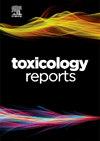榕树叶提取物的亚慢性口服毒性和体外抗神经炎评价及其在功能性食品中的潜在应用
Q1 Environmental Science
引用次数: 0
摘要
榕树叶是东亚地区广泛使用的传统药用植物,具有良好的认知增强作用。然而,其长期用药的安全性尚未得到阐明。因此,我们通过对Sprague-Dawley (SD)大鼠进行为期13周的重复口服毒性研究,评估了直叶菊乙醇提取物(EEFE)的亚慢性毒性。雄性和雌性大鼠分别给予0、500、1000和2000 mg/kg/天剂量的EEFE。同时监测临床症状、体重、食物消耗、血液学、血清生化、器官重量和大体尸检结果。任何剂量的EEFE均未观察到与治疗相关的死亡率或毒性作用。据此,确定无观察到的不良反应水平(NOAEL)为2000 mg/kg/天。此外,我们还观察到EEFE及其活性化合物芦丁对BV-2小胶质细胞的抗神经炎症作用。EEFE和芦丁显著抑制BV-2细胞中硝酸盐和前列腺素E2 (PGE2)的产生。这些结果支持了EEFE的安全性和抗炎作用,可以进一步开发为改善认知健康和年龄相关疾病的候选草药治疗或功能性食品。本文章由计算机程序翻译,如有差异,请以英文原文为准。
Subchronic oral toxicity and in vitro anti-neuroinflammatory evaluation of Ficus erecta leaves extract for potential functional food applications
Ficus erecta leaves, a traditional medicinal plant that is widely used in East Asia, have demonstrated promising cognitive-enhancing effects. However, the safety of its long-term administration has not been elucidated. Therefore, we evaluated the subchronic toxicity of an ethanol extract of F. erecta leaves (EEFE) by conducting 13-week repeated oral toxicity study using Sprague–Dawley (SD) rats. Male and female rats were administered EEFE at doses of 0, 500, 1000, or 2000 mg/kg/day. Clinical signs, body weight, food consumption, hematology, serum biochemistry, organ weights, and gross necropsy findings were also monitored. No treatment-related mortality or toxic effects were observed at any doses of EEFE. Accordingly, the No Observed Adverse Effect Level (NOAEL) was determined to be 2000 mg/kg/day for both sexes. Additionally, we observed anti-neuroinflammatory effects of EEFE and its active compound rutin in BV-2 microglia. EEFE and rutin significantly inhibited nitrate and prostaglandin E2 (PGE2) production in BV-2 cells. These results support the safety and anti-inflammatory action of EEFE for further development as a candidate herbal therapeutic or functional food for improving cognitive health and age-related conditions.
求助全文
通过发布文献求助,成功后即可免费获取论文全文。
去求助
来源期刊

Toxicology Reports
Environmental Science-Health, Toxicology and Mutagenesis
CiteScore
7.60
自引率
0.00%
发文量
228
审稿时长
11 weeks
 求助内容:
求助内容: 应助结果提醒方式:
应助结果提醒方式:


